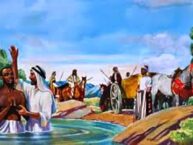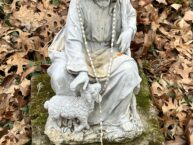 August 2, 2020: May God’s words be spoken, may God’s words be heard. Amen.
August 2, 2020: May God’s words be spoken, may God’s words be heard. Amen.
Okay, I admit it…I have been binge watching movies on the Hallmark channel lately, because they were running a Christmas in July movie marathon. Yup – totally going to get called out by the liturgical police, but hey – we need a little Christmas, right this very minute, given the way 2020 has shaped up, right?
Now, have you ever walked into your family room, or wherever you watch TV, flipped to a channel, and realized that you landed on a great movie, only it’s about 30 minutes into the action, and you have no idea what’s really going on? I mean, you can catch up a bit based on what is currently happening, and what the characters are doing or saying, but somehow you feel you are missing something. It’s frustrating, right? Oh sure, if it IS one of those Hallmark Christmas movies, you don’t really miss much, because they are all about the same: A young successful man or woman goes to a small town where Christmas is practically a Broadway production, meets some other man or woman – usually who drives a pickup truck and is beloved by everyone – and they give up their corporate job to write a book and marry this new love. So, 30 minutes into the action, all you need to know is that the new person in town will marry the person with the pickup, and if a strange guy walking around looks like Santa Claus – well, he might just BE Santa Claus.
But we don’t get that predictability in every movie, and so it is downright annoying when we enter into the middle of a story, right? And that, my friends, is what happened today in the gospel. No, we aren’t left wondering how a Fortune 500 CEO ended up in a small New England village, but we are placed in the middle of a story, and the worst part about it is that it was changed to make it seem like we started at the beginning!
Welcome to the strange world of our lectionary – the readings that are prescribed for any given Sunday in most major denominations. Because sometimes, for reasons I just can’t fathom, they start in the middle of the action. That is what happened in today’s gospel – in fact, they even changed the wording to make it seem like nothing was missing. We heard “Jesus withdrew in a boat to a deserted place by himself.” What the text actually says is “Now when Jesus heard this, he withdrew in a boat to a deserted place by himself.”
Heard what?
Well – that’s why he wanted to go someplace deserted! And it is important to know too, because the thing he heard from his disciples wasn’t that there was a fabulous Air B&B over in the desert, with a pool he could walk across and a wet bar. It was that John the Baptizer – his friend, his cousin, the one who prepared the way for him, who baptized him – had been executed. Pretty important plot twist don’t you think? Why on earth would they leave that out. It explains why he and his disciples would want to flee someplace out of sight, no? These were dangerous times for folks who rocked the boat, and Jesus would definitely fit the bill for that, to be sure.
So, that is our setting for this gospel narrative we heard this morning. Jesus and his disciples have heard about the execution of someone they loved, an itinerant preacher who proclaimed the truth of the identity of Jesus. They went someplace deserted to have a chance to grieve, to rest, and to gather their thoughts.
And given what 2020 has been like for us all, I think we can understand how Jesus and his disciples felt, because we too are grieving, weary, and fearful.
We have been filled with the grief of this pandemic, as the number of cases top 470 million, and the death toll surpasses 150,000, in our country alone. We have mourned our isolation from those we love continues, and as the financial strain from the economic impact of the virus puts people out of work and this church at risk. We grow weary as our forced isolation with family members strains even the best relationships, and as our children are in need of the socializing aspects of education, but anxiety about safety continues. We have witnessed too the selfish behavior of those who put their personal freedom above love of neighbor, and refuse to wear a face mask, or continue to gather in unsafe ways.
We have experienced the fear of our nation’s values of freedom and democratic norms threatened by the Executive Branch of our Federal Government, as they send armed and camouflaged agents into the streets of our cities to attack peaceful protesters with tear gas and batons.
We have mourned the gut wrenching racism, sexism, heterosexism, anti-Semitism, and other forms of hate and bigotry that infect the hearts of many and have given rise to violence and oppression in our streets.
And we have weeped as the rich gotten richer, while the poor have gone hungry.
All this, and we are only halfway through the year. 2020 has not been the stuff of Hallmark movies, has it. So, I think many of us can understand Jesus wanting to step away to a deserted place for a bit. It was his way of taking a breather from all that had happened – the death of his friend and cousin, his rejection in his hometown, the constant deceptive inquiries by temple authorities, and the incompetence of his disciples to comprehend what he was teaching them. He did some self-care and headed for a quiet place to chill a bit.
Still, it is hard for Jesus to travel incognito anywhere, despite the cool dark sunglasses, baseball hat, and fake mustache…kidding here… and the crowds follow him there. Now, if Jesus was only fully human, and not also fully divine, he might react like I think a lot of us would, grumbling about not having even 5 minutes to himself, and hanging out a big “Do Not Disturb” sign on the outside of the bathroom door before locking it, and settling in for a nice bubble bath. But, that isn’t what happened, was it.
Instead it says that “When he went ashore, he saw a great crowd; and he had compassion for them and cured their sick.” That in itself is a miracle – to have compassion in that moment – that moment when you are worn to the bone with grief and sorrow, when you feel you’ve got nothing left in you – yet your heart sees the pain of others and responds.
But wait, there’s more!
Now we know that this is the miracle of the feeding of the 5,000 – which is utter nonsense, because as it says, that was only counting the men. Why? Because then, as often now, women aren’t counted as being of value. So in fact the crowd was likely at least double that size when you add the women and children. And here is where it gets even more interesting, because this story is more about the disciples than about Jesus.
His followers are also feeling grief and likely some amount of fear having understood what John’s death meant for radical itinerant preachers and their followers. They are now in a deserted place with Jesus, and as evening draws near, they do the rational thing – they tell Jesus that he should send them away, because otherwise they won’t have anything to eat. For them, this is also being compassionate, for they felt that they could not adequately live into the laws of hospitality – they could not feed so many – and they did not want these people to starve.
Now, before we go further, there is something you should know about this feeding of the multitudes story. It is the only miracle or sign that is reported in all four canonical gospels – that is the ones in the authorized Holy Bible (there are other gospels, of course). Matthew, Mark, Luke, and even that outlier, John, has this story, though some of the details change. No other miracle or sign gets that much attention.
So, you have to wonder – why this miracle?
What is so important about this one? Why is this the one all gospel authors feel we must know about?
Well, perhaps the answer lies in these six words. “You give them something to eat.” That is what Jesus tells his disciples when they tell him that he should send them away so that they can get food for themselves.
“You give them something to eat.”
And in those words lie the very essence of what it means to be his disciple. His followers could only see the scarcity of the present moment – they were tired, fearful, and had just five loaves of bread and two fish. Jesus called them to move from a place of scarcity to that of abundance. To take what little they perceived they had and having offered it up to God, spread it around, letting God do the rest. But most of all – that discipleship wasn’t about sending the hungry away, or sitting back and hoping for a miracle. Being a follower of Jesus means taking whatever we have, even if it seems insignificant, even when we feel not up to the task, and offering it to God. If we do that, miracles will happen, and those that are hungry are not the only ones fed – we are too.
I told you this story several years ago, and it kept coming back into my heart this week, so please bear with me to hear it again. It is a story told by Mother Teresa:
“One night, a man came to our house to tell me that a Hindu family, a family of eight children, had not eaten anything for days. They had nothing to eat.
I took enough rice for a meal and went to their house. I could see the hungry faces, the children with their bulging eyes. The sight could not have been more dramatic! The mother took the rice from my hands, divided it in half and went out.
When she came back a little later, I asked her: ‘Where did you go? What did you do?’ She answered, ‘They also are hungry.’
‘They’ were the people next door, a Muslim family with the same number of children to feed and who did not have any food either. That mother was aware of the situation. She had the courage and the love to share her meager portion of rice with others. In spite of her circumstances, I think she felt very happy to share with her neighbors the little I had taken her.
In order not to take away her happiness, I did not take her anymore rice that night. I took her some more the following day.”[1]
I thought about this story because there are many scholars who surmise that what happened in that deserted place with Jesus and his followers wasn’t that the bread and fish were multiplied in some sort of divine act, but that the gift of compassion, the kind that Jesus demonstrated, the kind found in giving over what little one has to those who are hungry, was a blessing by God that touched the hearts of the people, who responded in much the same way as this Hindu woman, taking the gift to others, perhaps in this case, even adding what little they had, to spread the feast further. In this way, all were fed.
Perhaps that is true, in fact, I hope it is, because that would be an even greater miracle. For God to do this is on Her own would be one thing, but for us to act out of a sense of abundance rather than scarcity, for us to open our hearts to the blessing of God that is always there for us, to have the courage and faith to offer whatever we have, even if it seems so little, and know that by God’s grace working through us lives will be changed – well, that really is a miracle to behold.
That was the miracle Mother Teresa witnessed.
And here’s the thing – like that Hindu woman, who saw not just a day’s worth of rice for her hungry family, but a blessing to be shared with others, Jesus is teaching his disciples to see the world in much the same way. Jesus knows that by moving from “we only have five loaves and two fishes” to “thank you God for these five loaves and two fishes” is a transformative experience that blesses the hungry and the one who serves them both.
And to do that, to move beyond our fear to a place of love, we need to first remember that Jesus is with us – even in our deserted places, and the real work of a disciple happens when we recognize his presence, even in our scarcity. Jesus was teaching them, and now us, something about our lives as children of God – that whenever he is present – no matter how dark it may seem – there is always light, always hope, always love….and that is a miracle that we, as the body of Christ, can offer the world. For he is present with us now – calling in our deserted places, calling us out of our fear, out of our sense that we don’t have enough, calling us that we may be moved by compassion, and respond with the courage that comes from seeing God’s blessing in the smallest of things.
I opened this sermon talking about movies, and in “The Princess Bride, yup – totally going these days for the sublimely ridiculous – in that movie there is a scene where they’re about to storm the castle, and the question is asked: “What do we have as assets?” and the reply comes back to the effect, “Well, we have a wheelbarrow, and … the cloak of imagination.””[2]
Well, it doesn’t matter if we may not have a wheelbarrow, or even a cloak of imagination, but we have far more – we have a mantle of faith. A faith that teaches us that we don’t have to figure it all out on our own. We only need to know that God has compassion most especially for the vulnerable – the poor, the sick, the hungry, the lost, and the oppressed – and that God chooses to work through us to serve them. We just have to trust God to use us, and all that we have, for the sake of the world.
It happens every day you know. We just need to open our eyes and hearts to see it.
For God’s miracle is found in the parent who finds an energy they thought they didn’t have at the end of a long work day to help their special needs child past their own doubts to achieve a goal.
God’s miracle is found in the congregation who breaks through their pain of their beloved church closing, to see that their gift of presence in another parish are bread and fishes that will continue to feed the hungry in the name of Jesus.[3]
God’s miracle is found in mothers who use just what they have, their own bodies, to stand between protesters and armed federal troops, and fathers who use leaf blowers from their garages to push tear gas away from people fighting for the rights of others.
Miracles happen every day, because Jesus is with us every day, and this is a world that is hungry – hungry for food, for justice, for compassion, for peace, for hope, for love.
And Jesus is saying to us now, to everyone of you: “You give them something to eat.”
“YOU give them something to eat.”
Your offering to God of “loaves and fishes” – in answer to him who calls you to feed others – may just be the miracle the world, and you, need today.
Amen.
For the audio from the 10:30am service, click below, or subscribe to our iTunes Sermon Podcast by clicking here:
[1] From “Mother Teresa: In My Own Words,” compiled by Jose’ Luis Gonzalez-Balado, 1996
[2] Homiletics.com
[3] Concept from DavidLose.Net.
The Rev. Diana L. Wilcox
Christ Church in Bloomfield & Glen Ridge
August 2, 2020
Ninth Sunday After Pentecost – In A Time Of Separation
1st Reading – Genesis 32:22-31
Psalm 17:1-7,16
2nd Reading – Romans 9:1-5
Gospel – Matthew 14:13-21






